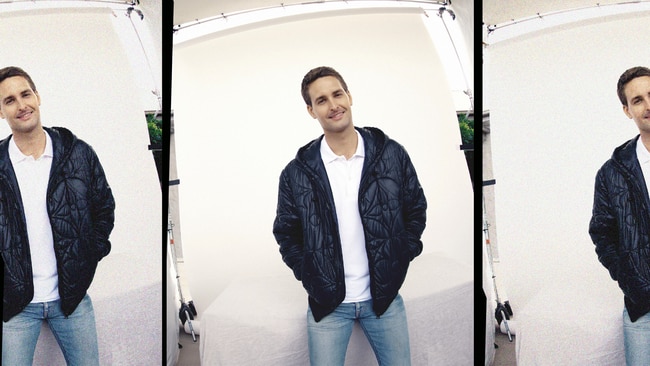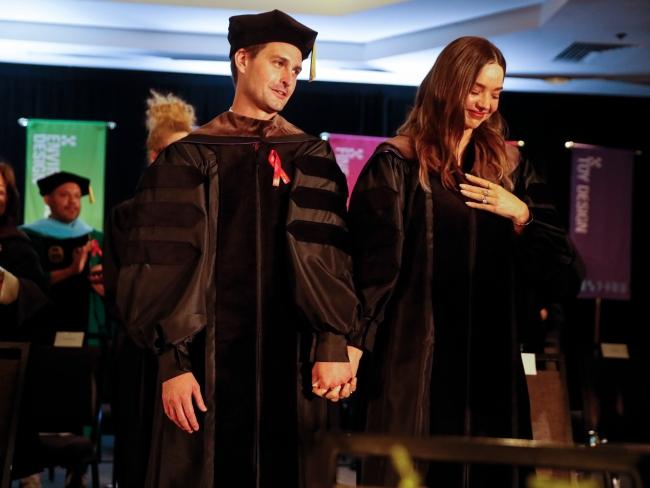Evan Spiegel reckons the next Snapchat could be made in Australia
The guy who became a billionaire at 25 after launching a company from his dad's shed sees real potential to start up something here.

The guy who became a billionaire at 25 after launching a company from his dad's shed sees real potential to start up something here.
Evan Spiegel is the moment.
The Snapchat founder, who graces the cover of the 2022 Innovators List to be published on Friday in The Australian, made headlines and hearts soar this year when he donated a reported $14m to his old school to help pay the student loans for an entire graduating class.
Unlike other Big Tech bros (👀 Elon Musk, Jeff Bezos et al) Spiegel prefers to stay off the grid.
The 32-year-old billionaire, who is married to model and wellness entrepreneur Miranda Kerr, rarely fronts the media and doesn't appear to have any public social media presence.
His public profile reflects his app - where photos and banter disappear after 24-hours. However, he wants to leave a more permanent legacy and carve a path for the next generation of creators and contributors.
But it seems his backstory is what has built him for success. Not to mention marrying the seemingly most chill woman in the world.
Before (and even after) Miranda, Spiegel was like any other nerd with a dream and drive.
He attended Otis College for summer design programs as a teenager, before heading off to Stanford University - an Ivy League institution - where he honed his coder craft and business acumen before launching Snapchat in 2011.
Fast forward to May 2022 when he and Kerr were invited to a graduation ceremony and were awarded honorary degrees from Otis.

Instead of a longwinded speech about himself and his success story, the couple launched their charitable foundation - the Spiegel Family Fund - and made the largest gift in the college’s history to help about 285 students with their version of HECS.
"It is a privilege for our family to give back and support the Class of 2022,” said Spiegel and Kerr in a statement after the news broke, “and we hope this gift will empower graduates to pursue their passions, contribute to the world, and inspire humanity for years to come."
What's his deal?
"My parents always let me try no matter what I was interested in, no matter how ridiculous it was or how likely it was that I would succeed,” the reclusive Spiegel said.
“In second grade I decided I wanted to learn how to play the trumpet, and my mum gave the OK straight away. So I rented my trumpet, I signed up for class, and within a couple of weeks, it was pretty clear that I had no future as a trumpet player.
“It was pretty much a disaster, but my mum never made me feel bad about it. She just said ‘OK, we’ll return the trumpet, and maybe you’ll find something else you like’. And my parents were always just very open with letting me try stuff, and eventually, that extended to computers.”
Spiegel was raised in California with two younger sisters and was never allowed to watch TV while growing up. His parents did let him build his own computer, just as long as it wasn’t connected to the internet.
He’d spend hours tinkering with graphic design and code in his school's computer lab until his dad eventually told him to go and get a job.
“One summer I interned working on a biomedical computation project for Abraxis BioScience, which essentially makes cancer drugs,” he said.
“And so we were all discovering new drugs by running simulations on GPUs [graphics processing units]. I just got to see and experience and try all sorts of different things and I failed at all of them, but along the way I somehow made it to school [Stanford University], where I met Bobby [Murphy, co-founder of Snap] and then we failed on a couple more things, before we had our success.”
The success Spiegel refers to is Snapchat, now used by more 330m people globally every single day, and 530 million every month, with its growth outranking that of giants Facebook and Twitter.
It’s an app that has spawned numerous imitators and made billionaires out of its co-founders, and whose roots can be traced back to a class project in which, like something out of a scripted sitcom about starting a tech company, Spiegel and his wildly ambitious early co-founding team were completely unaware they were building something that would fundamentally change the way we communicate.
“A friend of mine was living down the hall from me at school, and we were hanging out one day and he was like, ‘Oh my gosh, I’d love to send pictures that disappear’,” Spiegel said. “And I was like, ‘Oh, that’s really interesting’, so we started building a prototype. Bobby and I were working on another project at the time, but we started building a prototype, and we called it PiccaBoo.
“When I presented to the class, of course everyone is like, ‘Well, this obviously doesn’t work because you can just take a screenshot, so no one’s going to use it’. But Bobby and I really liked it, because we were just sending photos back and forth really quickly. Back then, it took about a minute to send a photo via MMS, but we invented a way to send them much faster.”
Snapchat’s functionality was much faster than texting - and far less expensive - and caught on quickly among Spiegel’s friends group.
“We were talking with pictures, so we renamed it Snapchat,” he said. “By this time we were working on it at my dad’s house, and we launched it in the app store.”
Enter Miranda
He’s a regular visitor to Australia, especially given that he’s married to the Gunnedah-raised Kerr.
The pair met at a party hosted by Louis Vuitton at the Museum of Modern Art in New York and now have two small children together, sons Hart, 4, and Myles, 2, as well as Kerr’s 11-year-old son Flynn from her first marriage to actor Orlando Bloom.
Their first date was at a Los Angeles yoga studio and Spiegel says Kerr recently introduced him to a new type of yoga - Kriya - that he says has changed his life.
“The energy and clarity I get from meditating has just become addictive for me,” he said. “That‘s something in the past couple of years that has been really useful, especially through stressful leadership challenges and managing the pandemic, and just everything that‘s been happening.”
His thoughts on the Australian tech sector
Australia is where Spiegel established Snap’s Asia Pacific headquarters, and the company has a fast-growing presence in its Sydney HQ.
Spiegel says he’s been incredibly impressed with the Australian startup founders he has met on his multiple jaunts down under.
“What our teams are doing in Australia is amazing,” he said.
“A lot of our work on real-time calling is work happening in Australia. “What’s also so exciting is the thriving Australian startup scene, and one of the things I’ve noticed is that so many brilliant founders seem to think global first, and that’s unique.
“Maybe it’s just the perspective from being in Australia, but the ambition to build a global business is so clear and you can feel it so strongly across Australian founders, and I think that’s why you’ve seen some of these just massive breakout global success stories from Australia. It’s really super exciting.”
His advice for new hustlers
Spiegel cites two key lessons – the first from a Stanford class on entrepreneurship and venture capital that reminded students: “You have two ears and one mouth, use them in that proportion”.
“That lesson has really stuck with me as a leader, especially in a business where we’re trying to make stuff that people want to use,” Spiegel said. “The way to do that is by listening and listening really carefully, to our team members, to our community and to our partners.”
The second lesson comes from when the Snap team were still working at Spiegel’s dad’s house, and the nugget of inspo was delivered by Peter Fenton, who was a general partner at a venture capital company called Benchmark.
“It was the early days of our business, and we’re just starting to get momentum and more interest in the business and he said, ‘Evan, you just got to get really good at saying no’,” Spiegel recounted.
“I asked what he meant and he said, ‘As the business gets more momentum, people are wanting to want to do partnerships, and they’re gonna want you go and speak at their conference and spend time helping them with their business. Just say no and focus on serving the community’. And that for us was so crucially important, because when you’re a small company your resources are so limited," Spiegel said.
“It’s so hard to invest in any new product or new feature, and so by really focusing, that helped us continue to grow the business at a fast pace and never lose sight of the important thing, which is serving our community.”


